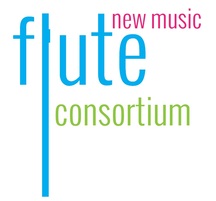Get to Know...Margareta Ferek Petric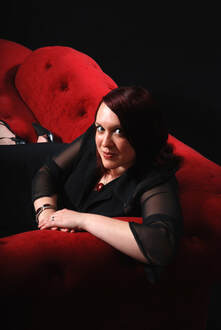 Each time I write a composer spotlight for a work in the flute and accompaniment category I’m reminded how strong the entries are each year. Over the last two days, I’ve listened to each of last year’s works and all three (Jean Ahn’s Toys, Margareta Ferek Petric’s Beastie Poetry, and Joseph Hallman’s four pieces) are really intriguing works that I would enjoy playing and I feel this way pretty much every year! Like many of our members, I’ve played many of the winning, honorable mention, and finalist works and have a list of others I want to play in the future! Flutists are spoiled by the wealth of wonderful music being composed! Today, we have the opportunity to learn more about Margareta Ferek Petric composer of Beastie Poetry for flute/piccolo and piano. Beastie Poetry was selected as a finalist in the flute and accompaniment category in 2018. If you listen to Beastie Poetry and read her response to the question “what about new music for flute appeals to you?” I think you’ll come to the same conclusion I did, that Margareta is incredibly successful in exploring the many timbres of the flute without seeming cliché. Margareta organically incorporates extended techniques in a way that is much appreciated. Margareta recently shared with us some very exciting news, she was recently chosen as the new artistic director of Music Biennale Zagreb, founded in 1961, the festival is dedicated purely to contemporary experimental music. She will be the first woman to serve as artistic director. Congratulations, Margareta on this significant accomplishment! Q&A with Margareta… What about new music for the flute appeals to you? Flute offers a bright spectrum of possibilities which I find crucial for composing - it allows one to be subtle and rough, to explore the clichés of classical beauty, but to always be able to muddy and reframe the sound into experimental abstraction. The wide range of the flute family opens a playground for various ideas and the capability of using so many extended techniques uphold these ideas in a very special way. Who is/are your favorite “new music” composer/s and why? It is impossible to point out names of personalities and pieces without needing several pages to write them all down. Besides the renowned composers from the contemporary music scene, I discover my favorite ones along the way while visiting concerts and festivals, very often those are now living composer colleagues with refreshing new ideas and strong messages that they express through their music. Describe your musical background and current activities. Growing up in Croatia got me the natural privilege to be in a strong connection with the expression of the music of the Eastern Europe and the tradition of the western classical music was very well taught both in music schools back there and also later at the University in Vienna. I suppose these two strong influences always flow through my blood while composing and almost force me to find a middle way between them, but also enable me to switch in-between these worlds. Right now, I am very excited to work on a piece for accordion and ensemble and a chamber opera, which will be a big challenge since I have never written one. Between big commissions I always try to find time to write pieces which are dedicated to musicians whose work I love and respect and who are always supporting me to write new compositions for them. I find this very personal kind of collaboration very fruitful for both sides, especially for promoting contemporary music and us - now living and working composers. Where/How do you seek for the inspiration for your works? I cannot imagine my life without being curious about other art forms, science, politics, society, etc. There is always a story in my mind I want to tell, but I have to narrate it with sound. I suppose one can feel privileged in a position as a composer to persistently be able to reveal the current mindset through creative work. So, the impulses that give inspiration can mostly be found in an everyday life - book that you just read, painting that cannot leave your head after visiting the latest exhibition, interesting line from a movie last night, absurd political situation, inspiring talk with a stranger while walking home or simply the need to discover something new in some context outside of musical expression and take on the challenge to express it though notes. More About Margareta… Margareta Ferek Petric was born 1982 in Zagreb, Croatia. She studied composition with Ivan Eröd, Chaya Czernowin and Klaus Peter Sattler at The University of Music and performing Arts in Vienna. She was granted scholarships from various institutions and foundations (Home Suisse Foundation, Thyll-Dürr Foundation, Austrian Ministry of Culture, Office of the Austrian federal Chancellor - State Scholarship for Composers, etc.). In 2010, she was invited for a working stay in Casa Zia Lina on Elba by Thyll-Dürr Foundation and in 2011 she received a Theodor Körner Award for an orchestral composition Take 7. Since 2015 she is working as a part of the managing committee of the Austrian Society for Contemporary Music (ÖGZM). In 2016 Croatia was represented by Margareta´s music on 63rd International Rostrum Of Composers. 2017 she became a prize winner of Advancement Award from the city of Vienna. In 2018 Ferek-Petric was declared Artist in Residence of the Carinthian Summer Music Festival, she was awarded with Croatian prizes: Josip Stolcer Slavenski Award and Boris Papandopulo Award (both for All the world´s a stage - as the composition of the year in Croatia) and Prix Annelie de Man 2nd Prize and an Audience Prize in Amsterdam (both for the harpsichord piece Istaratu). Few of the latest works have been recorded on albums published by Decca Records and Croatia Records. Her music is being regularly commissioned and performed by renowned ensembles and instrumentalists, diverse festivals and is being played in radio stations around the world. Margareta´s work is “colorful, ironic and deep – with a strive to create absurd sound images”. She lives and works in Vienna, Austria. Learn more on her website: www.margaretaferekpetric.com If you Liked Beastie Poetry… DUO: Beastie Poetry - for Flute/Piccolo & Piano (2018) Searching for Spaces - for Bass flute & Pno (2016) Mad darkness I - for Traverso flute & Harpsichord (2015) QUARTET Climate Burn-Out (stress trilogy: part II) - for flute/alto flute, clarinet, cello & piano (2018) Fire Walk With(out)me - for Paetzold recorder, flute, harp & harpsichord (2017) (and a second video) QUINTET Spukgedichte - for Soprano, Fl/Bass fl., Cl, Vln, Vcl, Text by Richard Schuberth (2016) Noncerto - for Renaissance/Barock Recorder (optional with flute) & String Quartet (2013) ENSEMBLE Neun Echos - for Sopr., traverso flute, baroque oboe, baroque bassoon, baroque vln, Violone/G & Organ (2018) All the world ́ s a stage for Fl, Ob, Cl, BCl, Ten.Sax., Bsn, Hn, Trpt, Tromb, Tuba, 2 Timp, Perc, Pno, Harp, Strings (1,1,1,1,1) (2017) dieMacht for Fl, Ob, Cl, BCl, Bsn, Hn, Trpt, Tromb, 2 Timp, Perc, Pno, Strings (1,1,1,1,1) (2015) Wiener Schnitzel Uncensored - for Fl/alto fl., Cl, Vln, Vla, Vcl, Pno (2014)
2 Comments
Get to Know...Martin Rokeach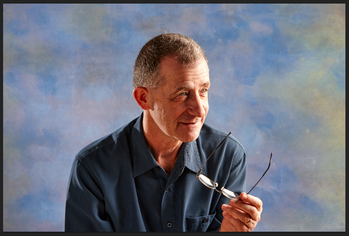 In addition to the opportunity to reacquaint myself with the piece they were honored for (in this case Going Up? for flute, viola, and cello), my favorite aspect of writing these features is learning a bit more about the composers. I often find a surprising or fascinating fact, an interesting parallel to other composers, a new piece I love, or a connection to someone I know or an FNMC member. While preparing Martin Rokeach’s composer spotlight, I found all of these! Perhaps of greatest interest to our members, many of whom love the piccolo as much as I do, Martin composed a wonderful piccolo concerto, available both in the original version for piccolo and orchestra and a very effective 2018 transcription for piccolo and piano. FNMC commissioning member Amy Likar has been a huge supporter of this concerto, she presented the world premiere performance with the Oakland Symphony Orchestra and has subsequently performed the orchestral version several times most recently with the University of Southern California Concerto Orchestra. She has also performed the version with piano reduction multiple times including at the NFA Convention. If Amy’s support and my enthusiastic endorsement haven’t inspired you to listen, perhaps this review from the premiere might. In it, The San Francisco Chronicle wrote of Rokeach’s writing for the piccolo: “this is unmistakably a work written with its specific circumstances in mind. Rokeach revels in the particular sonorities of the piccolo — particularly its sweet-toned, rather vulnerable low register, which is worlds away from the piercing shrillness with which it usually blasts its way through an orchestral texture. And he lavishes the solo part with care and solicitude. He just doesn’t ask the piccolo to dance like a clown for your amusement. It’s a perfect balance to strike.” I suspect that when many of our piccolo loving members listen to the concerto they will be programming it as well! If you’re looking for a less substantial work in terms of time, but one that is in no way less substantial musically, check out his incredible Nocturne for piccolo and piano, written for the wonderful Eldred Spell. I’m listening to it as I write and thinking I must program it soon! I love the use of the low register (something Eldred demanded…read the cute story of its origin below) and the dark mood! I was interested to find that Martin is a guitarist who began his journey in music playing popular music. He is at least the fourth composer honored in our competition to take that course. Martin’s work for flute, viola, and cello, Going Up? was chosen by FNMC members as a finalist in the chamber music category in 2018. It’s a charming and energetic work that our members will certainly want to explore. Martin has graciously provided us with detailed program notes for each of his solo and chamber works for flute below. All of the music mentioned in this spotlight can be heard on Martin’s website (www.martinrokeach.com) or Youtube and we've linked directly to the pieces throughout the spotlight. Q&A with Martin… Who is/are your favorite “new music” composer/s and why? Some of my favorite living composers are, in no particular order: Julia Wolfe, Jennifer Higdon, David Lang, Frank LaRocca, Jesse Montgomery, John Adams, Robert Greenberg, Osvaldo Golijov. Their music is unique and reflects their individuality, but something they all share is compelling musical ideas with powerful expressive substance married to exquisite craft. Describe your musical background and current activities. Like most guitarists I started out as a folk-picking and pop-music player and came late to classical music. I adore music of almost all stripes and styles -- classical, jazz, blues, rock, North Indian raga, Persian classical, mariachi and so much more. My guitar duo will soon be performed in New York and Brazil, and my clarinet music will be played this November in Colorado and California. Probably of more interest to your readers, this fall Christie Beard will play my piccolo nocturne in Nebraska and in 2020 the European premiere of Going Up? will take place in Denmark. Do you have any upcoming events that you would like our friends and followers to know about? Piccoloist Amy Likar is currently playing my piccolo concerto (the piano reduction version) on her tour of the southern U.S. and will perform the orchestral version again in March 2019 with the University of Southern California Concerto Orchestra. What advice can you give to flutists about approaching new music in practice? Put the same effort and understanding into your music that a fine actor does while preparing a character. Just as composers shouldn't be shy about seeking advice from players, performers should feel free to ask composers for feedback and coaching. More About Martin… The music of composer Martin Rokeach has been performed by the Oakland Symphony, Berkeley Symphony, Master Sinfonia Chamber Orchestra, San Francisco Concerto Orchestra, United States Army Orchestra, Pacific/Mozart Ensemble, Ensemble Variant (Geneva), Chameleon Arts Ensemble (Boston), Dunsmuir Piano Quartet (San Francisco), League of Composers (NY), the Chicago Ensemble, Musica Nova (Macedonia), Duo Sforzando (Geneva), Wyck Trio (U.K.), Vermont Contemporary Music Ensemble, the St. Petersburg (Russia) Chamber Players, the Sheridan Players (Chicago), the Webster Trio (Houston), Guitarinet (Poland), New Dischord (Chattanooga), Tempo (Los Angeles) and many other outstanding ensembles and soloists throughout the United States, Europe, and Australia. His works have earned honors in fourteen national or international composition competitions, most recently those sponsored by the International Horn Society, Audio Inversions of Austin, International Clarinet Association, National Flute Association, and the Chicago Ensemble, and he has been commissioned to write music for the Oakland Symphony, Ellsworth Smith International Trumpet Competition, New York’s Cygnus Ensemble, Switzerland’s Dobrzelewski/Marrs Duo, Left Coast Chamber Ensemble, Music Teachers Association of California, California Association of Professional Music Teachers, New York’s Eight Strings and a Whistle and numerous soloists. His music has been published by Hickman Music Editions, Kagarice Brass Editions, Northeastern Music, Fallen Leaf, Go Fish Percussion Publications, and ALRY and recorded on the Furious Artisans, Albany, MSR Classics, Arizona, Emeritus, North/South, Capstone, and Amie labels. He has been a featured composer and speaker at the Sion Conservatory of Switzerland, Hartt Conservatory of Music, New York University and Wichita State University, and concerts devoted exclusively to his music have been held at Washington State University and Western Carolina University. Mr. Rokeach earned his Ph.D. in music composition and theory from Michigan State University and Bachelor's and Master's degrees from San Francisco State University. A Professor Emeritus at Saint Mary's College of California, for 33 years he was one of the artistic directors of the San Francisco Bay Area's contemporary music concert series, Composers, Inc. Currently he is writing an oratorio on the subject of the Great Flint Sit-Down Strike, to be premiered in 2020-21 by the Oakland Symphony and Chorus. www.martinrokeach.com If you Liked Going Up?... Can’t Wait for flute (or violin), clarinet, piano; 1-movement, 7’ (1999) Program Notes Did you ever feel so excited to do something you didn’t think you could wait, but you had to wait anyway? To my ear, this is the feeling that drives the piece. Concerto for Piccolo and Orchestra [piano reduction]; 3-movements, 19’(2018) Concerto for Piccolo and Orchestra; 3-movements, 19’ (2015) Program Notes For years I have loved the innocent, haunting timbre of the piccolo’s low register. Sounding so much like a boy soprano, the instrument possesses a unique voice that affects and informs the entire direction of the Concerto for Piccolo and Orchestra. Almost every concerto has a dynamic between soloist and orchestra not unlike a leader and a sometimes agreeable, sometimes unruly congregation. To my ear, the piccolo-leader is like a brilliant child, both innocent and profound, encouraging, cajoling and inspiring a congregation of less wise adults. Of course a three-movement work for piccolo and orchestra cannot remain innocent and haunting from first bar to the last. To remain engaging it must display emotional breadth and contrast, and I hope this is revealed throughout the concerto. The first movement opens with a statement, more declamatory than melodic, that is like an urgent proclamation. It traverses through emotional terrain that is sometimes anxious, mysterious, quietly intense, powerful. It is in the second movement, “Still We Hope,” that the beautiful low register of the piccolo more fully unfolds. Its mood conveys our belief, our yearning, however irrational, that somehow a better world awaits us just around the corner. The movement does not quite resolve. Instead it lands on the solo triangle that introduces the finale, whose mood is celebratory, playful, and finally, ecstatic. Going Up? for flute, viola, cello; 1-movement; 7’ (2008) Program Notes Going Up? was commissioned by the New York trio Eight Strings and a Whistle and premiered in 2008. To my ear, the material and energy of the piece continually pulls the listener upward, hence the title. There are three themes, all ascending, introduced in the first moments respectively by the flute as the piece opens, the pizzicato cello in measure 4, and the pizzicato cello again in measure 8. What should the listener make of all this upward momentum? Might there be some kind of emotional or spiritual meaning behind the notes? I don’t know. Nocturne for piccolo and piano; 1 movement 6’15” (1985) Program Notes Written in 1985 for Eldred Spell, my Nocturne explores the very expressive, yet rarely heard low register of the piccolo. It is a succinct work, conveying a mood of tenderness mixed with resignation. A little more background regarding Nocturne In graduate school at Michigan State University I became close friends with the wonderful flutist Eldred Spell. We gave a number of flute/guitar recitals, and I learned much about writing for the instrument. In 1982 I wrote my very challenging Variations for Flute and Piano for Eldred. After performing it numerous times and recording it he said: "You know I've worked like a dog for you and you owe me. I want another piece, one for my piccolo. It has to emphasize the gorgeous low register and be easy enough to sight read." He didn't leave me the option to say no. Sleepless Night for flute, violin, cello, guitar; 1-movement, 6’ (2006) Program Notes To my ear, this one-movement quartet conveys a sense of restrained agitation, an inability to find repose, which reminds me of laying awake in quiet turmoil. Variations for Flute and Piano; 1-movement, 11’ (1982) Program Notes The term “variations” often connotes sterility but, to me, there is no musical form that is more personal. The opening theme, three emotionally charged phrases, ebbs and flows from one variation into the next, often without pause, and sharply differing moods pour forth as a result. The outline is as follows: Theme -- Maestoso Variation 1: Mournful; delicate Var. 2: Cold, with little expression Var. 3: A little faster Var. 4: Angrily Var. 5: Mournful Var. 6: Passionately Var. 7: Giocoso Var. 8: Con spirito Var. 9: Somber Var. 10: Allegro Reiteration of original theme Var. 11: Coda; espressivo During my earlier years as a composer, friends and colleagues sometimes teased me for my apparent lack of imagination regarding the titling of my pieces. Kind listeners, I can only hope that you find the content of the work contains more passion than its title. Get to Know...JP Merz Many people might look at a score for two piccolos and electronics and say, “No Way!” Not our members, a lot of our members love to play the piccolo and drops on a living surface the winning work in the flute duo category this year is garnering a lot of interest from the membership. Composer JP Merz describes the pieces as one that “imagines the cone of a loudspeaker as a thin barrier between the physical and digital world -- a surface for drops of electricity to come alive. These drops begin quietly, almost bell-like, and accumulate into a majestic, electric rainstorm.” He skillfully exploits all of the ranges and colors the piccolo can produce in a really interesting work for a rare instrumentation. We think you’ll agree, there are two performances available on JP’s website. photo credit-Owen Zhou Q&A with JP… Describe your musical background and current activities. My love of music-making began in southern Wisconsin playing guitar in rock/jazz bands, viola in orchestra, and making strange electronic tracks on my family's computer. I always enjoyed creating in whatever style I was in, but when I was exposed to even more traditions in college, I became overwhelmed by the possibilities. At some point I realized that composition can focus all of my interests into one practice. Much of my work is concert music for classically-trained musicians but I frequently draw on my previous experiences in other traditions and also enjoy collaborating with musicians and artists from different backgrounds. I’ve made string quartets, electro-acoustic works, arrangements for singer-songwriter albums, custom performance software, feed-backing robotic objects, a voice controlled massage chair installation, among other things. Who is/are your favorite “new music” composer/s and why? Too many to list, but my one sentence answer is usually: anyone on New Amsterdam Records for their efforts in democratizing genres and supporting stylistically diverse projects. If I were to name a single, independent composer though, it would be Meredith Monk. Her relentless exploration of the voice and ability to convey emotion and story without words is always inspiring to me. What about new music for the flute appeals to you? Obviously the versatility and huge range of color is amazing to work with. But for me the main appeal is working with flutists themselves, who are always so supportive and excited about new music. That feeling comes from working directly with enthusiastic flutists on a pieces of mine, seeing flute teachers encouraging their students to work with composers or through the awesome efforts of FNMC. What advice can you give to flutists about approaching new music in practice? Don’t be afraid to take risks, try new things and truly interpret the music. In my opinion this is true for all music really, but especially for brand new or rarely performed works. As a composer, it’s a great feeling when the performer is more focused on making the piece their own rather than worrying about playing it “correctly” or even the way I intended. More About JP… JP Merz is a composer who works with classical, jazz, and rock musicians, as well as improvisers, dancers, electrical engineers, internet researchers, programming languages, and robots. His recent work explores intimate, emotion-driven, and kinesthetic experiences of sound. JP’s work has been performed by members of the JACK Quartet, Altius Quartet, Playground Ensemble, Iowa Center for New Music, and Colorado Music Festival Orchestra at places such as the Weill Hall of Carnegie Hall, New Music Gathering, Boulder Museum of Contemporary Art, Madison New Music Festival, San Francisco Fringe Festival, the Abrons Arts Center, record stores, coffee shops and living rooms. In 2016, he received support from the American Composers Forum's JFund for New Music and interned with his favorite new music series, Liquid Music. In addition to composing, JP performs on electric viola, guitar, and electronics with an eclectic variety of groups ranging from new music/improv ensembles to folk-rock bands. This fall he began his DMA in composition at the University of Southern California. http://www.jpmerz.com/ If you like drops on a living surface… an eagle flew Year of Composition: 2015 Instrumentation: soprano, viola, flute, and piano Duration: 5’05” Out, out Year of Composition: 2013 Instrumentation: flute and electronics Duration: 11’24” Get to Know...Dana Wilson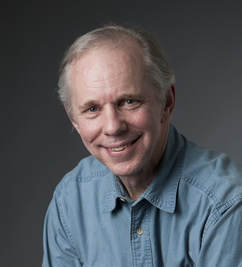 Dana Wilson was named the winner of the Newly Composed Category in 2016 for his work for solo flute and chamber ensemble (ob, 3 cl, bcl, bsn, hn, tpt, tb, pf, perc, db), entitled The Conjurer. This lovely flute concerto in two movements was inspired by the world’s shamanic traditions. Commissioned by a consortium of flutists and wind ensembles, The Conjurer received its first performance in April 2015 by Gabe Southard. The Conjurer is included on a disc of his flute music entitled “The Conjurer: Chamber Music for Flute by Dana Wilson” featuring his colleague at Ithaca College, Wendy Herbener Mehne. She will perform The Conjurer at the 2017 NFA Convention on the New Flute Solos Concert at 1:00 PM on Saturday August 12, 2017. Another of Dana’s works will also be performed; FNMC member Christine Erlander Beard will present the NFA Premiere of Whispers from Another Time for piccolo and piano on the Piccolo Recital II (10:00 Sunday, August 13, 2017). We’re hoping to catch up with Dana at the convention and feature him in a Facebook live interview talking about The Conjurer and Whispers from Another Time, but in the meantime, we wanted to ensure that he was featured! Q&A with Dana… What about new music for the flute appeals to you? The flute has so many colors and textures, and is able to move from one to another in such a seemingly effortless way, thus providing depth and drama to a given passage or gesture. Describe your musical background and current activities. I’ve been composing a long time but only came to the flute in recent years in terms of commissions and lots of performances. (I’m so grateful to all the flutists in the world who are eager to explore new works!) I started my musical life as a jazz pianist and so a good deal of that aesthetic and its musical elements creep into my music. Maybe as a result of that, I’m drawn to the range of color and articulation that the flute provides. What advice can you give to flutists about approaching new music in practice? Think of all the sounds in the world—from birdcalls to violent storms—and how the flute can explore each so effectively, often jumping dramatically from one to another. Be open to the incredible fluidity that the flute allows music and musical drama to project. More About Dana… The works of Dana Wilson have been commissioned and performed by such diverse ensembles as the Chicago Chamber Musicians, Formosa String Quartet, Xaimen Symphony, Buffalo Philharmonic, Dallas Wind Symphony, Voices of Change, Netherlands Wind Ensemble and Tokyo Kosei Wind Orchestra. He has received grants from, among others, the National Endowment for the Arts, New York Foundation for the Arts, New England Foundation for the Arts, New York State Council for the Arts, Arts Midwest, and Meet the Composer. His compositions have been performed throughout the United States, Europe, East Asia and Australia, and appear on over 30 record labels. Dana Wilson holds a doctorate from the Eastman School of Music and is Charles A. Dana Professor Emeritus at the Ithaca College School of Music. He has written about his compositional process in A Composer’s Insight and Composers on Composing for Band, and is co-author of Contemporary Choral Arranging, published by Simon and Schuster. www.danawilson.org If You Liked The Conjurer... Afterglow Instrumentation: flute, clarinet, violin, cello, piano, and percussion Date: 2011 All Our Yesterdays Instrumentation: flute, clarinet, horn, violin, cello, piano, and percussion Date: 1999 Duration: 25” Allusions Instrumentation: flute and piano Date: 2013 And longing to be… Instrumentation: flute and piano or harp Date: 2013 Breathing the Water Instrumentation: flute and guitar Date: 2010 Dancing with the Devil Instrumentation: flute, clarinet, violin, cello, piano Date: 1998 Duration: 10” Gold Mosaic Instrumentation: flute, oboe, and piano Date: 2015 Luminescence Instrumentation: alto flute and guitar Date: 1998 Duration: 4’ Mirrors Instrumentation: wind quintet Date:1994 Pu Em Remu Instrumentation: flute and percussion Date: 1997 Shallow Streams, Deep Rivers Instrumentation: flute, horn, and piano Date: 2007 Sing to me of the Night Instrumentation: flute, guitar, and cello Date: 1999 Whispers from Another Time Instrumentation: piccolo and piano Date: 2001 Get to Know...Greg Steinke 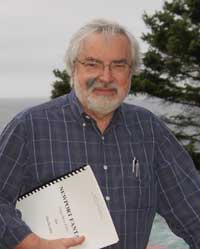 Oregon-based composer Greg Steinke has twice been a finalist in the FNMC Composition Contest. In 2014 for his flute duo Van Gogh Vignettes and in 2015 for his flute quartet In Memoriam: Sacagawea. FNMC members have performed his compositions at the Florida Flute Fair and Kentucky Flute Society Conventions. Q&A with Greg... Describe your musical background and current activities. I am a longtime composer/oboist/conductor who is still actively composing and occasionally performing on oboe and conducting. What flutes, brands, and accessories (if any) do you like to perform new music on? I prefer hearing my flute pieces performed on a Powell flute - it has always been my favorite. When did you join FNMC and what attracted you to the organization? Became a FNMC composer a couple of years ago - wanted to avail myself of performance opportunities for my flute compositions. More About Greg… Dr. Greg A Steinke is retired, former Joseph Naumes Endowed Chair of Music/Art and Associate Dean of Undergraduate Studies, Marylhurst University, Marylhurst, Oregon; Associate Director, Ernest Bloch Music Festival (‘93–97) and Director, Composers Symposium (‘90–97) (Newport, OR); served as the National Chairman of the Society of Composers, Inc. (1988–97). Composer of chamber and symphonic music and author with published/recorded works and performances across the U. S. and internationally; speaker on interdisciplinary arts, and oboist specializing in contemporary music. Dr. Steinke is the current national president of NACUSA and also serves on the NACUSA Cascadia Chapter Board. Learn more at www.gregsteinke.com If you liked In Memoriam: Sacagawea and/or Van Gogh Vignettes... CROSS CURRENTS, (for Reciter and Chamber Ensemble (Flute/Native Flute, Violin, Trombone, Contrabass and Piano); 2004 ECHO POINT LOOKOUT An Australian Blue Mountain Triptych (Image Music XXXIX) (for Reciter, Flute/Alto Flute, Oboe d’Amore, Contrabass and Piano); 2013 EXPRESSIONS IV Fantasy on a Painting of Edvard Munch (Image Music XXXV) for Oboe, Violin, Violoncello, and Piano (also version for Flute, trumpet, Violoncello, and Piano) 2012 IMAGE MUSIC from Songs of the Fire Circles for Flute, Oboe, Trombone, and Contrabass, 1982 INQUIETUDE for Flute Solo, 1995 A JAPANESE FOLK SUITE, (for Reciter and Flute/Alto Flute or Oboe); 1992, rev. 2001 EIN JAPANISCHES LIEDERBUCH for Soprano, Chamber Ensemble (flute, violin, cello, harp, piano/celesta, percussion) and slides, 1971 “LET US TAKE WHAT WE CAN FOR THE OCCASION,” (for Reciter, Flute/Piccolo, Contrabass and Piano); 2002 LYRIC FANTASY (A Music for Dance) for Flute, Alto Saxophone, and Guitar, 1980 Moments at CANYON DE CHELLY (Image Music XXVI) for Flute and Oboe Duet, 2005 Moments from WHITE BLOWING DAFODIL SEEDS (Image Music X-A) for Piano Trio, 2000, +o PUB; also versions for Flute,Violoncello and Piano, 2003 PUB, for Flute, Bassoon and Piano, 2004 PUB, and for Trumpet, Violoncello and Piano,2004 NORTHWEST SKETCHES II for Flute, Oboe, and Piano, 1980 NORTHWEST SKETCHES II-A for Flute, Oboe, and Wind Ensemble, 1982 NORTHWEST SKETCHES II-B for Flute, Oboe, and Chamber Orchestra, 1982 ONE BY ONE (Image Music II) for Flute and Harp, 1985 RANDOM BLACKOUTS III (Image Music XL) for Baritone, Flute, and 2 Percussion 2015 THREE SONNETS from William Shakespeare for Soprano, Flute, and Strings, 1962-64 TIP TOP TAP BALLROOM BONANZA for Alto Saxophone and Contrabass (also versions for flute, clarinet or soprano saxophone in B-flat and contrabass); 2014 TO GET TO FRESNO, (for Voice, Clarinet [or Flute] and Piano); 2004 TOMORROW ON YESTERDAY (Image Music IV) for Harp, 1989, @ (Carroll McLaughlin) + o PUB; as (Image Music IV-A) for Flute, Harp, Percussion, Harp Ensemble, and Trombone Ensemble, 1989 WIND RIVER COUNTRY for Woodwind Quintet, 1986 YAPONCHA - “Wind Spirit” (Image Music XX) for Flute, Viola and Harp, 2002 7 - 4 - 3 for Dancers and Chamber Ensemble (flute, cello, percussion), 1969 Get to Know...Paul Elwood 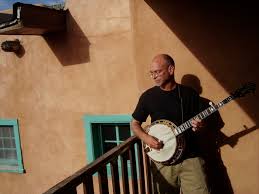 Our second Colorado-based finalist, Paul Elwood is Associate Professor of Music Composition at the University of Northern Colorado. Paul was a finalist in 2014 for his flute duet, Marfa Lights (flute 2 doubling piccolo). Q&A with Paul … What about new music for flute appeals to you? I love the timbral diversity of the instrument from diverse rich tones that the instrument produces to a wide variety of extended techniques available. I like the fact that many flutists with whom I've worked tackle a variety of techniques, rhythms, and compositions with an open mind. Who are your favorite “new” music composers and why? Thomas Adès for his inventive use of the instruments, and his complexity of writing at the micro- and macro-level; Augusta Read Thomas for not only musical construction but beauty of orchestration; Sean Friar and Andrew Norman ("Nouveau LA School Composers") for their youthful energy, virtuosic technique, and musicality, and Caroline Shaw for her unbridled and inspired writing. What are your favorite new music pieces and why? "Concentric Circles," violin concerto by Adès, a colorful, energetic composition; "Partita" by Caroline Shaw, for reasons cited above, and "Fighting Words" by Sean Friar using text from a variety of political speeches. There are a host of others from "classics" including Crippled Symmetry by Morton Feldman that uses beautiful, if random, combinations of colour between flute, glockenspiel, and piano, Stockhausen's early electronic work for their sheer monumental invention, and Messiaen's "Oiseaux Exotiques," an early strong influence on my work. Do you have any upcoming events that you would like our friends and followers to know about? I'm finishing a double concerto for violin and cello for the University of Northern Colorado orchestra, beginning a work for electric guitar and chamber ensemble commissioned by French experimentalist Jean Marc Montera, and working on an ongoing abstract multi-media homage to silent film actress Louise Brooks. She never compromised her intellectual integrity for fame - which ultimately cost her her career in film; there never seemed to wallow in self-pity after she made her last film (one of John Wayne's first) and ended up selling shoes in NYC for a spell. "Marfa Lights," the composition selected as a finalist in the FNMC competition, will be performed in November in Iowa City with the University of Iowa Percussion as part of my evening-length concept presentation titled "Strange Angels: exploring the paranormal." What advice can you give to flutists about approaching new music in practice? Listen to a lot of new music (listening to "old" music is a given) and keep an open mind to as much of it as you can. More About Paul… Paul Elwood’s music has been featured at festivals in Moscow, Sofia, Mexico City, Marseille, Wollongong (Australia), Edinburgh, Darmstadt, Madrid (July 2015), Strasbourg, and all over the U.S.A. Performers that have played his music include pianist Stephen Drury, percussionist Stuart Gerber, the Bent Frequency Duo, Zeitgeist (Minneapolis), the Callithumpian Consort (Boston), the North Carolina Symphony, the Charleston Symphony, the Wichita Symphony, Tambuco (the Mexican Percussion Quartet), saxophonist Jon Gudmundson, and Ensemble Signos (Mexico City). Recent recordings are on Innova Recordings as composer/banjoist with percussionist Famoudou Don Moye of the Art Ensemble of Chicago (titled Nice Folks, January 2015), Misfit Toys (2013, featuring drummer Matt Wilson, percussionist Dan Moore, and reed player Robert Paredes) and his own chamber and folk music, Stanley Kubrick’s Mountain Home (2011), with bassist Bertram Turetzky (2008), and Electric Cowboy Cacophony (2008). He is a Fellow of the American Academy in Rome and of the Camargo Foundation (Cassis, France), and he has won fellowships to the MacDowell Colony, the Djerassi Artists Foundation, the Ucross Foundation, and Fundacion Valparaiso in Spain. In 2000 he won the Sigma Alpha-Iota Inter-American Music Awards and was awarded a 2007 commissioning grant from the Jerome Foundation to compose for Zeitgeist. Elwood’s compositions are published by C.F. Peters, Smith Publications, and his own Western Wear Music Publishing. Elwood is an active five-string banjoist in both the realms of experimental and bluegrass music. In 2015 he played on the premiere of “Hanover” by Alvin Lucier, a composition using three banjos played with EBows with chamber ensemble. He is working on a new composition for solo banjo written for him by Christian Wolff And he has collaborated with guitarist Jean-Marc Montera, guitarist Eugene Chadbourne, cellist Hank Roberts, the Callithumpian Consort of the New England Conservatory, famed banjoist Tony Trischka, Zeitgeist, bluegrass legend John Hartford, percussionist Eddie Prévost, and pipa player Min Xiao-Fen, among many others. For more information visit his website: www.paul-elwood.com or blog http://soundchoice.typepad.com If you enjoyed Marfa Lights check out Paul’s other works with flute… A Vast Ocean of Promise Instrumentation: solo bassoon with flute, clarinet, piano, two violins, viola, and five-string banjo Duration: 18:00 Year of Composition: 1999 Along the Mystic Thruway Instrumentation: flute, piano, cello Duration: 9:00 Year of Composition: 1996 Alters Altered Instrumentation: flute and piano Duration: 6:00 Year of Composition: 1998 Blue Prairie Instrumentation: yodeler with flute, clarinet, piano, violin, and cello Duration: 15:00 Year of Composition: 1990 Circo De Montes, Teatro De Las Nubes Instrumentation: flute, clarinet, violin, viola, cello Duration: 9:30 Year of Composition: 2001 Deirdre’s Lament Instrumentation: flute, two percussion, piano, two violins, cello and banjo (Ballet) Duration: 50:00 Year of Composition: 2010 Entre Irse Y Quesdarse Instrumentation: flute, clarinet, piano, violin, and cello Duration: 13:00 Year of Composition: 1990 Four Directions Instrumentation: flute (wearing Velcro-soled shoes) Duration: 6:00 Year of Composition: 1991 Pilot Jack Knight: Aviator Instrumentation: flute, bass clarinet, piano, percussion, violin, and cello Duration: 4:30 Year of Composition: 1987 Road of Darkness, Distant Moon Instrumentation: double bass, flute/piccolo, percussion, five-string banjo Duration: 11:00 Year of Composition: 2003 Snow Falls Ceaselessly Instrumentation: flute, cello, percussion, piano, and audience players Duration: 15:00 Year of Composition: 1984 Stanley Kubrick’s Mountain Home Instrumentation: soprano, Appalachian instruments (fiddle, banjo, mandolin, guitar) flute, clarinet, piano, violin, cello Duration: 25:00 Year of Composition: 2001 Strange Angels: Exploring the Paranormal An evening length collection of works that includes Marfa Lights Year of Composition: 2010 The Eternal Sky Instrumentation: flute and piano Duration: 9:30 Year of Composition: 2008 The Vault of Heaven, The Crystal Sea Instrumentation: solo cello with flute, clarinet, percussion, piano, and violin Duration: 20:00 Year of Composition: 1995 The Void Beneath The Coffee Table Instrumentation: solo banjo, flute, clarinet, piano, violin, and cello Duration: 15:00 Year of Composition: 1989 Two Extremities Instrumentation: soprano, piano, bowed five-string banjo, flute, violin, and wine glasses Duration: 7:30 Year of Composition: 1998 Under the Table Instrumentation: soprano, flute, cello, and banjo Duration: 10:30 Year of Composition: 2012 Usher Instrumentation: flute, clarinet, percussion, piano, violin, and cello Duration: 40:00 Year of Composition: 1988 Verbum Salutis Instrumentation: flute, bass clarinet, cello, percussion, and hand signer Duration: 8:00 Year of Composition: 1985 |
AuthorThe Flute New Music Consortium is an organization dedicated to the creation and support of new music for the flute. Archives
June 2019
Categories
All
|

 RSS Feed
RSS Feed
